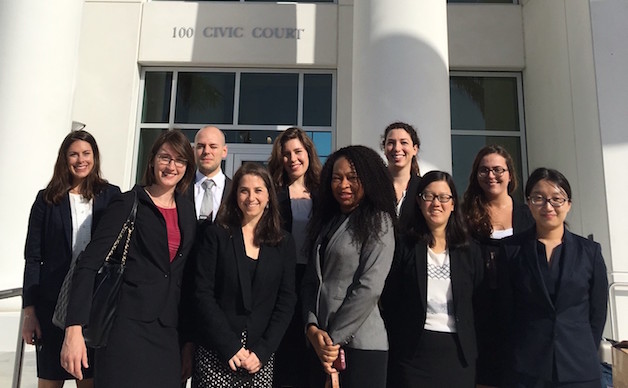Turner Clinic continues fight in long-running opposition to Florida nuclear reactors

Back row, L to R: Jeanna Heard, Kacper Jastrzebski, Fiona O'Carroll, Charlotte Courtade, Jennifer Black Front row: Caroline Reiser (fellow), Mindy Goldstein (director), Arlette Woguem, Jin Lee, Sharon Yu
Turner Environmental Law Clinic students traveled to Florida this month for a hearing on Florida Power & Light’s plans to build two more nuclear reactors at its Turkey Point site. The controversy has been running for seven years, but could be decided by year’s end, said Clinic Director Mindy Goldstein.
The issue is environmental and public health concerns over the proposal to inject wastewater under the site to cool the reactors, Goldstein said. Turkey Point is in Homestead, about 25 miles south of Miami and directly adjacent to the Everglades National Park.
Opponents argue more study about possible upward migration of wastewater is needed before the U.S. Nuclear Regulatory Commission can make an informed licensing decision. They argue the polluted wastewater could contaminate an underground source of drinking water for roughly three million nearby residents.
“The NRC and FPL continue to wish away the problem, saying upward migration would not occur,” Goldstein told the Palm Beach Post.
The hearing was held in Homestead before the NRC’s Atomic Safety Licensing Board.
The Turner Clinic, along with with co-counsel Jason Totoui of the Everglades Law Center and Diane Curran of Harmon Curran Spielberg & Eisenberg, represents the National Parks Conservation Association, Southern Alliance for Clean Energy, and two local residents in their challenge to the utility’s application to construct and operate the new reactors.
They say an environmental impact statement issued last November isn’t sufficient, and argue carcinogens present in the up to 60 million gallons of reclaimed water to be used daily for cooling could contaminate the aquifer, should it migrate from the project’s Boulder Zone wells. They cite a 2015 study that finds wastewater could escape through cracks and fault lines that run through the zone’s top layers.
A panel of three administrative law judges questioned experts from both sides at the May 2 hearing—on whether contaminated wastewater could enter the aquifer, and the health impact should that occur, Goldstein said. The next step is for the parties to submit a final round of briefing in June.
“Then the Board will make a recommendation to the Nuclear Regulatory Commission on whether to issue the license for Turkey Point,” Goldstein said. “The Commission will then reach a final decision, probably by the end of the year.”